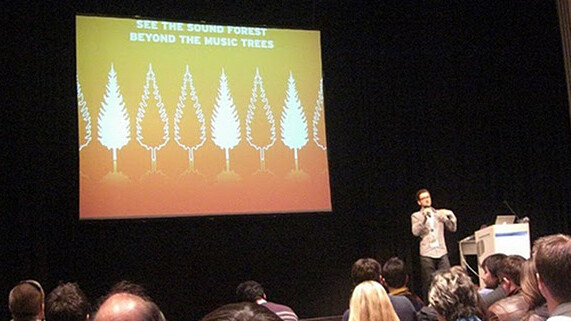
Sound will be bigger than video on the Web – that’s the assertion SoundCloud CEO Alexander Ljung made on stage during the first day at The Next Web Conference in Amsterdam today.
You may think that the man behind the social audio sharing platform has a vested interest in such a statement, but he’s certainly passionate about his mission. Audio is a “Speed-dial to the emotions,” Ljung argued, noting that audio use online is evolving to the point where people are learning not to just ‘read’ sound, but to ‘write’ it too. We’re becoming ‘Sound literate’, he believes.
To demonstrate this, Ljung discussed some of the ways that people are expressing themselves through sound. Demoing the iPhone app LaDiDa, he showed how people can turn a sung melody into a full song complete with backing track automatically. Closer to home, he discussed how a public company had been in touch with SoundCloud about publishing their earnings calls via the platform. He also highlighted PostSecret’s Living Voices project, which publishes poignant voicemail messages that tell personal stories.
Ljung also revealed that he listens to The Next Web’s Daily Dose in the shower each day; something we heartily recommend you do too.
Spotify and the power of social music
Ljung is clearly excited about audio’s potential and his talk was followed by Jonathan Forster of Spotify, who gave some fascinating insights into the power that the music streaming service can offer to musicians and labels in understanding the tastes of their listeners.
Spotify focuses on presenting music as a social object that you can share. As an example, Forster said that 75% of Spotify links shared on Facebook receive comments – showing how people are keen to share and discuss music online. Social engagement is important for Spotify – data shows that the more engaged a user is with the service, the more likely they are to become a subscriber. Presently, just over one million (around 10%) of the company’s users are paid subscribers.
Meanwhile, the data that can be extracted from the music that the service’s 10 million users are listening to is highly impressive. Spotify worked with the band Hurts to track listening activity around their album release. The company was able to compile a UK heatmap, showing the areas of the country that had the highest numbers of Hurts fans (London and Sheffield held particularly strong clusters).
Spotify’s data can identify peaks in listening data for particular songs, as well. Abba’s ‘Mamma Mia’ spiked in popularity in Norway on New Year’s Eve, and since then average daily listens for the song have been higher than they were before that spike. While the specific reason for this may be unclear, this is the kind of data that the music industry would undoubtedly love to see more of, helping to understand demand for, and popularity of, specific artists and songs. The ability to extract such data isn’t unique to Spotify, it shows how online music consumption empowers the industry to understand the market in more detailed ways than ever before.
“We still haven’t figured out what Spotify is”
Interestingly, while Spotify is known for music streaming now, don’t be surprised if it evolves over time. “We still haven’t figured out what Spotify is,” Forster said, suggesting that the service may well encompass more than it does now over time.
 Spotify is keen to highlight independent musicians who are profiting from the service. He singled out Nomy, an independent Swedish musician who has been making music in his room and giving away for free online for nine years. He now makes a healthy living on Spotify, Forster said, although he hasn’t quit his dayjob as he enjoys the social side of it. Nomy has reached number 9 on Swedish Spotify top list – a significant achievement as 1-in-3 Swedes use Spotify regularly.
Spotify is keen to highlight independent musicians who are profiting from the service. He singled out Nomy, an independent Swedish musician who has been making music in his room and giving away for free online for nine years. He now makes a healthy living on Spotify, Forster said, although he hasn’t quit his dayjob as he enjoys the social side of it. Nomy has reached number 9 on Swedish Spotify top list – a significant achievement as 1-in-3 Swedes use Spotify regularly.
Oh, and we had to ask Forster about Spotify’s US launch (seriously, it’s compulsory!). His answer was that it took the company two years to obtain the relevant license to launch in Europe, so it was understandable that the biggest music market in the world would take time. “We’re honestly making progress,” he said, stating that “We think we’ll get there fairly soon.”
Audio online is at an exciting stage right now, and SoundCloud and Spotify’s presentations demonstrated this perfectly.
The Next Web Conference is only just warming up today. It kicks into full gear tomorrow – expect full coverage of everything you need to know right here on TNW.
Get the TNW newsletter
Get the most important tech news in your inbox each week.




